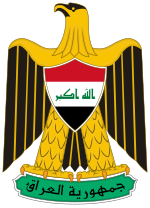Ministry of Trade (Iraq)
This article has multiple issues. Please help improve it or discuss these issues on the talk page. (Learn how and when to remove these messages)
|
| وزارة التجارة | |
 | |
| Agency overview | |
|---|---|
| Headquarters | Baghdad, Iraq 33°19′17″N 44°22′0″E / 33.32139°N 44.36667°E |
| Minister responsible |
|
| Child agency |
|
| Website | mot.gov.iq |
The Ministry of Trade (MoT; Arabic: وزارة التجارة) is the cabinet-level ministry of the Iraqi government responsible for regulating and facilitating trade activities in Iraq. It owns a conglomeration of state-owned enterprises and operates a nearly $6bn annual budget that provides a monthly public food distribution program for Iraqis. This conglomerate also manages the import of grain, seeds, and construction materials.
While Iraq is a potentially wealthy country due to huge oil deposits, decades of wars and sanctions have led to the collapse of infrastructure and social services. These occurrences have resulted in many people being left without sufficient food or nutrition. A 2008 survey estimated that 930,000 Iraqis were food insecure, with an additional 6.4 million vulnerable to food security without the Public Distribution System (PDS).[1]
History
[edit]Iraq's food rationing system was established in 1995 as part of the United Nations Oil-for-Food Programme following Iraq's invasion of Kuwait. Under the Public Distribution System (PDS) every Iraqi, irrespective of income level, is entitled to a monthly food ration for a nominal fee. Most of the Ministry's 3000 trucks and 400 warehouses are dedicated to the PDS.[2] However, the programme has been plagued by mismanagement and corruption since the 2003 US-led invasion. With annual costs running at more than US$4 billion, the Iraqi government is looking at ways to reform the system to target only the most vulnerable people in need of such assistance.
Anti-corruption officials and the Iraqi army went to the ministry's offices in central Baghdad on April 29, 2009 to detain nine people on corruption charges. Their attempted roundup triggered a 15-minute gunfight between the military and the minister's security team. Only the minister's spokesman, Mohammed Hanoun was detained. Two of Sudani's brothers, one who worked for the ministry and one who headed the Iraqi Grain Board, were arrested the following day.[3]
In May 2009 Iraqi Trade Minister Abdel Falah al-Sudani resigned and was later arrested amid allegations of corruption and embezzlement linked to the nation's food assistance programme.[4] Sudani, a member of Prime Minister Nouri al-Maliki's Shiite Dawa faction, had been questioned by parliament over claims relating to imports for Iraq's food rationing programme. The minister was accused of importing expired commodities—sugar—and procuring illegal contracts as well as failing to fight corruption in his ministry.
In December 2009 the United Nations World Food Programme and Iraqi Ministry of Trade signed a 'Memorandum of Understanding' under which the two parties agreed to work together to improve the supply chain management of the Public Distribution System (PDS) which provides a monthly food ration to millions of Iraqis. The agreement was signed in Baghdad by Edward Kallon and the Iraqi Minister of Trade, Dr Safa Al-Deen Alsafi.
Mission statement
[edit]The official stated purpose of the Iraqi Ministry of Trade is to facilitate and promote trade and commerce in Iraq. It aims to encourage private sector development by removing regulations blocking trade and investment, eliminating import licensing rules, and embarking on wide-ranging projects to promote a new trading environment in Iraq: an anti-corruption drive, a consumer welfare and protection unit, a “Baghdad International Fair" site and the leasing of Iraqi shopping centers to private developers.
Associated companies
[edit]The Iraqi Ministry of Trade has number of associated State Companies: Iraqi Fairs, Food Stuff Trading, Constructions Stuff Trading, Grains Production, Grains Trading, Central Markets and Vehicles and Machines Trading. In addition, there are also a number of 'directorates' for Private Sector Development, Planning and Purveying, Administrative and Financial Affairs, Economic and Foreign Affairs and the Registration of Companies Department.[5]
Establishments
[edit]List of countries with an Iraqi Commercial Attache
[edit]- Iraqi Commercial Attaché Bulgaria
- Iraqi Commercial Attaché China
- Iraqi Commercial Attaché Egypt
- Iraqi Commercial Attaché France
- Iraqi Commercial Attaché India
- Iraqi Commercial Attaché Italy
- Iraqi Commercial Attaché Japan
- Iraqi Commercial Attaché Jordan
- Iraqi Commercial Attaché Russia
- Iraqi Commercial Attaché Tunis
- Iraqi Commercial Attaché Turkey
- Iraqi Commercial Attaché UK
- Iraqi Commercial Attaché USA
External links
[edit]See also
[edit]References
[edit]- ^ "and Iraqi Trade Ministry Form Partnership to Strengthen Food Distribution Capacity | WFP | United Nations World Food Programme - Fighting Hunger Worldwide". WFP. 2009-12-17. Retrieved 2016-05-23.
- ^ "U.S. Department of State Careers - About the Iraqi Ministries". Archived from the original on July 7, 2010. Retrieved June 29, 2010.
- ^ "AFP: Iraq trade minister resigns amid corruption claims". Archived from the original on May 24, 2013. Retrieved June 29, 2010.
- ^ "Middle East | Dramatic plane arrest of ex-Iraq minister". BBC News. 2009-05-30. Retrieved 2016-05-23.
- ^ "IraqiFairs.com". Iraqi Fairs. Retrieved 2016-05-23.
